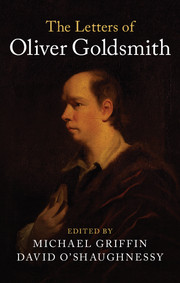41 - To Richard Penneck, [Edgeware Road, c. 16 March 1772]
Published online by Cambridge University Press: 12 December 2024
Summary
The Reverend Richard Penneck (1728–1803) was rector of Abinger in Surrey, and of St John, Southwark, courtesy of his patron the second Earl of Godolphin. A nephew of antiquary William Borlase (1696–1772), Penneck became the second keeper of the reading room of the British Museum in 1761 when the first holder, Peter Templeman, was sacked. He remained in this office until his death. He was also a chaplain of Trinity College, Cambridge (1757–1802), where he took his BA and MA degrees.
In 1771, Goldsmith took up residence at the cottage of a farmer named Selby who lived outside the village of Hyde, about 6 miles outside of London on the Edgeware Road. He would stay here for the summer, go back to the city in the winter, before returning again in the spring of 1772.
This letter throws additional light upon Goldsmith's and Percy's dependence on each other's interest in early English poetry. Goldsmith's ballad ‘Edwin and Angelina’ had been privately printed in 1765 to complement Percy's Reliques of Ancient English Poetry before its appearance in The Vicar of Wakefield a year later. This letter shows that this mutual interest was sustained into the 1770s.
The date can be determined from the letter following which acknowledges receipt of the poem requested here so we can be confident they were written in close proximity.
The copy-text is the manuscript in the Library of the Historical Society of Pennsylvania, Philadelphia. It was first published in S. H. Harlowe, ‘Original Letters of Dr. Johnson and Oliver Goldsmith’, Notes and Queries 5.7.163 (1877), 101–2. The letter was endorsed by Penneck ‘([NB] I sent Dr G. the M.S.)’ in the top right-hand side of the folio. Below this ‘No. 50’ was written, first in pencil and then in ink, in a different hand.
Dear Sir,
I know not what appology to make for troubling you with this letter, but the consciousness of your readiness to oblige when it lies in your power. Without more preface, I was some time ago, when in London looking over the Catalogue of the Harleian manuscripts, and in the middle or about the middle of that large book the title and the beginning of an old Saxon poem struck me very much.
- Type
- Chapter
- Information
- The Letters of Oliver Goldsmith , pp. 104 - 105Publisher: Cambridge University PressPrint publication year: 2018

